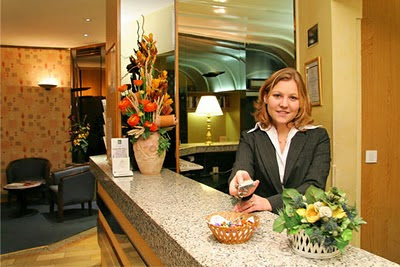Serving others

One stormy night many years ago, an elderly couple entered the reception of a small hotel in Philadelphia. They approached the counter and asked, "Can you give us a room?".
The employee, a man attentive and quick movements, said: "I am truly sorry, but today three conventions are held simultaneously in the city. All our rooms and those of other nearby hotels are busy." Discreetly expressed Marriage strain, it was difficult at that hour and in that time so horrible could find where to sleep. The employee then said, "Look ... I can not let them go no further in this downpour. If you accept the discomfort, I can give my own room. I'll fix it with the couch in the office, since I spend all night looking what happens. "
The couple rejected the offer because it seemed to abuse the courtesy of the man. But the employee insisted cordially and finally occupied the room. The next morning, to pay for my stay, the man told the clerk: "You are the type of manager that I have on my own hotel. Maybe someday build one for returning the favor done to us today." He took the phrase as a compliment and they parted amicably.
After two years, received a letter from this man, which reminded him of the story and sent her a roundtrip ticket to New York with the specific request you to please attend. With some curiosity, accepted the offer. After a brief tour, the older man took him to the corner of Fifth Avenue and 34th Street, said an imposing building with a facade of brownstone and said: "This is the hotel I am building for you." The clerk looked at him in amazement: "You're joking, right?". "I can assure you that," he said. That's how William Waldorf Astor built the original Waldorf Astoria and hired its first manager, named George C. Boldt.
Clearly Boldt could not imagine that his life was changed forever when he politely detail to meet the old Waldorf Astor on that stormy night in Philadelphia. But what happened is an example of how to serve others is something that always has a good return, especially when one does not seek or expect it.
Friendship, love, happiness and service to others, are closely related realities. No one can ensure happiness, but what is appropriate to each endeavor to deserve it. Happiness is like the reward of virtue. That is why Plato said that "if the face of virtue may be, fall in love to all."
Improving our own virtue, and therefore people be sincere, loyal, generous, patients or workers, should not be a narcissistic endeavor, and an aimless pursuit of excellence itself just a stubborn selfish and ridiculous. The improvement is achieved when staff are not seen as an end in itself, but when we are pressing the need to treat people well.
Friendship, love, happiness and service to others, are closely related realities. No one can ensure happiness, but what is appropriate to each endeavor to deserve it. Happiness is like the reward of virtue. That is why Plato said that "if the face of virtue may be, fall in love to all."
Improving our own virtue, and therefore people be sincere, loyal, generous, patients or workers, should not be a narcissistic endeavor, and an aimless pursuit of excellence itself just a stubborn selfish and ridiculous. The improvement is achieved when staff are not seen as an end in itself, but when we are pressing the need to treat people well.
Accustomed to think of others and assist them, without servility, is a good way to overcome this foolish sentimentality that initially but then exhale generosity backs out, always with very reasonable reasons, when it comes to the truth daily. As people acquire the maturity and freedom to overcome the constraints of selfishness, this approach makes its way to full service life of interest and spontaneous joy. Templar's self with its desires and its miseries, purifies the spirit of many small reasons for sadness born of excessive attachment and concern for oneself.


Comments
Post a Comment